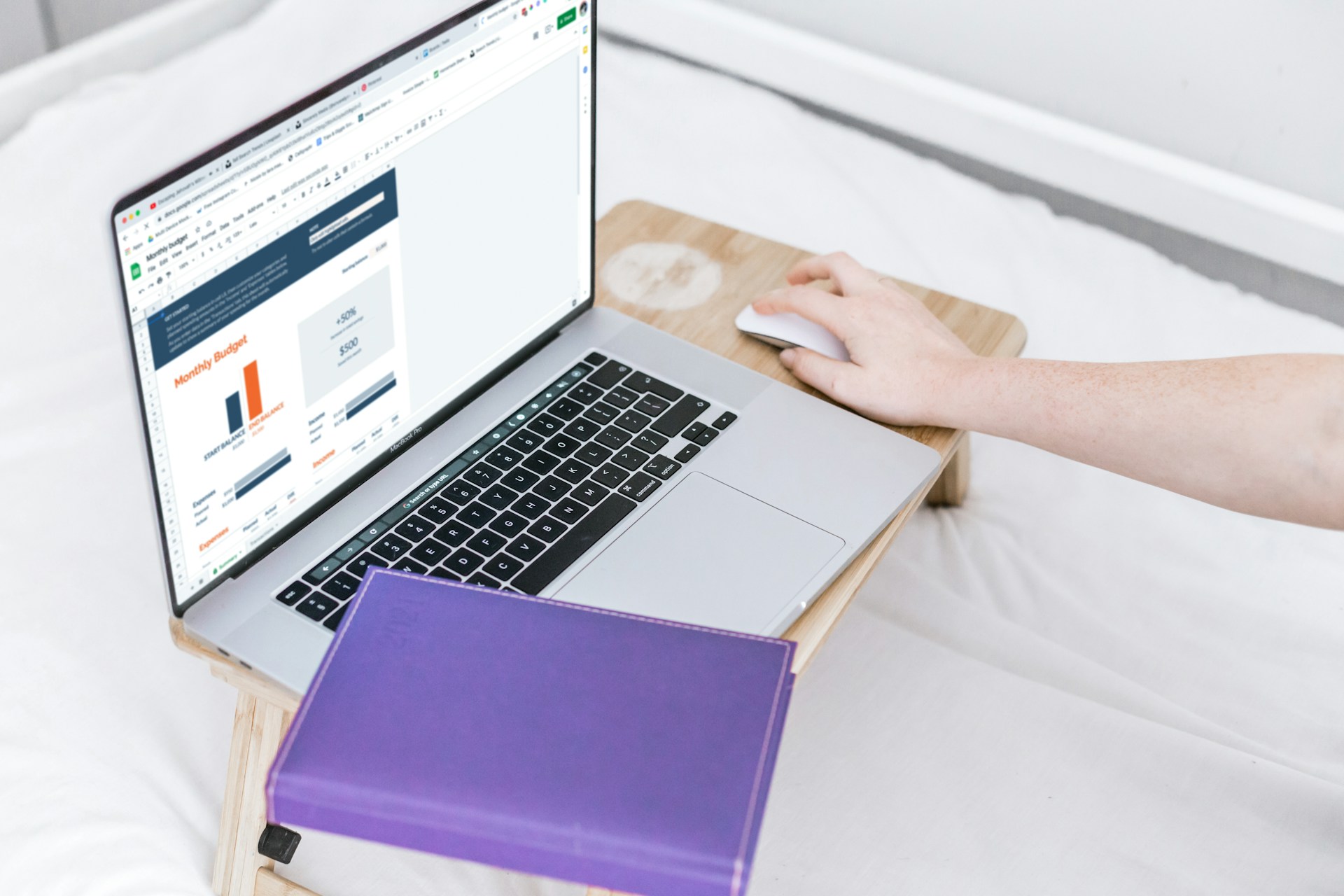Budgeting is one of the most essential tools for maintaining healthy financial habits. This is just having a plan for your finances for personal financial growth which makes budgeting important. You will be amazed at how much you can achieve your financial goals with a budget. Who doesn’t feel more secure with a plan in place?
A good budget will prevent you from “spending blindly”. It will also allow you to allocate your money to different areas in your life. You can have your payments done on time. For example, personal bills, utilities, or even happiness funds e.g. holidays and a new car.
The Role of Budgeting in Long-term Financial Success
Budgeting ought to be in your plans for financial independence. Whether you’re just starting in your career, juggling family expenses, or setting ambitious savings goals, budgeting is important to help you make informed financial decisions that lead to success in the long run.
1. For Financial Clarity
It’s important to know how much money is coming in or going out to keep track of your finances. A budget helps you see your financial future at a glance. It also helps you track your expenses, allocate your money according to your expenses, and prevent you from overspending. When you know your finances clearly, you can make better financial adjustments and ensure you spend your money consciously. This clarity is key to keeping your finances healthy, especially when working towards long-term goals.
2. Setting Realistic Goals for Long-term Success
Budgeting is not just about cutting down your spending, it’s also about setting realistic financial goals. Remember these goals are personal and may be different from one person to another. You might be saving for a down payment on a house, building an emergency fund, or planning for retirement. Budgeting is important because it lays the foundation for reaching these milestones. When you break your long-term goals into smaller, achievable steps, you stay motivated and ensure you don’t stretch your finances. With a budget, you can allocate resources to what matters most. This will also ensure that you’re steadily working toward a financially secure future.
3. Staying Financially Flexible and Disciplined
One of the attributes of a budget is that it should be flexible. It should be able to be adjusted according to the different circumstances in life. Life happens and we experience unexpected shifts. You could find a better source of income, relocate, and need more resources or you could lose your job. A budget helps you fit in with whatever life throws at you in the moment. Since you already have a plan, it’s easier to work with what you already have. At the same time, budgeting teaches you financial discipline. Learning how to prioritize needs over wants helps you avoid impulse spending. You are then able to focus on sustainable habits that build financial security over time.
4. Access to The Long-Term Payoff of Consistent Budgeting
The magic of budgeting starts to show over time. As you stick to your budget month after month, you’ll notice how much progress you’ve made toward your financial goals. The stress that used to come with surprise expenses or tight months will fade. Over time, this consistency will translate into long-term financial success, as budgeting creates the space for you to save, invest, and grow your wealth strategically. You’ll begin to see how small, disciplined actions like cutting back on non-essential expenses lead to significant financial achievements. The financial security and flexibility that budgeting brings will empower you to make smarter decisions, whether it’s building an emergency fund or investing in your future. As you continue refining your budget, you’ll experience the long-lasting benefits of financial control and freedom.
How to Create an Effective Monthly Budget
Some people love to track or calculate their expenses monthly. A budget can help them understand where their money goes every month you have a budget that helps you feel more in control of your finances, it makes it easier to achieve your financial goals.
1. Track Your Expenses
The first step to creating a budget is understanding where your money is going in relation to how much is coming in and going out each month. Track your expenses for two to three months without making significant changes to your spending habits. After identifying your spending patterns, make a list of your monthly expenses, starting with the mandatory bills (NEEDS) that are the most important, like rent, utilities, and groceries. These are the essentials that keep your life running smoothly. On the other hand, entertainment and discretionary spending (WANTS) include things like holidays, coffee dates, new gadgets, or birthday gifts. While not essential, these wants are important because they add joy and balance to your life, making it more fulfilling beyond work and obligations.
2. Set Financial Goals
Financial goals are personal milestones that you plan to reach, whether it’s saving enough to buy your dream home, securing a higher-paying job, or simply treating yourself to a special outfit. While financial goals are unique to each person, they should be specific, time-bound, and flexible, as circumstances may change. To make goal-setting easier, break them down into long-term, mid-term, and short-term objectives. Writing them down helps you stay focused and motivated and allows you to track progress and cross them off as you achieve them, one step at a time. By setting clear goals, you create a roadmap for your financial journey, ensuring you’re always moving toward something meaningful. With each milestone achieved, you build not just wealth but confidence in your financial future.
3. Adjust and Stick to your Budget Plan
A budget should not be fixed but rather flexible. It should be able to accommodate your current life regarding your financial situation. The beauty of budgeting is that it’s a dynamic tool, one that evolves with your financial situation. By regularly reviewing and tweaking your budget, you’ll ensure it stays relevant and effective. As your income, expenses, or financial goals shift, a well-adjusted budget helps you stay on top of your priorities without feeling restricted. Flexibility also allows you to adapt to unexpected events—whether it’s a sudden expense or a financial windfall giving you the confidence to navigate life’s changes smoothly. Ultimately, a flexible budget keeps you in control, empowering you to make choices that align with your financial well-being.
4. Budget for Your Current Debt
If you have any debt, your budget should include a specific debt repayment category, prioritizing paying it off. For high-interest or bad debt, cutting down on non-essential expenses, or “wants,” allows you to reallocate funds toward reducing your debt faster. By focusing on debt repayment, you not only lower your financial burden but also improve your credit score over time. As your debt decreases, you can gradually increase savings and allocate more to other financial goals. This disciplined approach helps you regain control of your finances and set a foundation for future financial stability.
Tracking Your Expenses: Why Every Dollar Counts

One of the key elements of successful budgeting is tracking where your money goes. Tracking your expenses keeps you in a better position financially because it guides you on how to allocate your finances. Even the smallest purchases can add up over time and throw your budget off course. That’s why tracking every dollar is so important because it provides clarity and control over your financial habits.
The Underlying Costs of Small Purchases
It is easy to ignore the small purchases we make on a day-to-day basis and even easier if we do not have a budget. Small purchases are inevitable in our course of life and may include: buying a snack, ordering takeout, or satisfying your cravings by buying something like chocolate. However, these “small” expenses can add up quickly and may surprise you when you see the totals at the end of the month. Through tracking your expenses, you can identify these small purchases and cut costs where you were overspending for example, you can decide to cook and not order take out and this would save you some money.
Making Use of Tracking Tools
Thanks to Fintech, budgeting is now easy and can be accessed quickly. Before, budgeting might have seemed difficult because tracking your expenses on paper was time-consuming and cumbersome. Budgeting apps like BudgetnKE, spreadsheets, or even your banking app can provide you with real-time data on where your money is going. Checking your finances regularly allows you to have a better understanding of your spending habits. It also allows you to make adjustments to your budget based on your current lifestyle. Don’t just have a budget and let it sit there, use available tracking tools to check and refine your budget from time to time. This helps ensure you’re staying on track with your financial goals. If you want to learn more about Mastering Financial Literacy Through Fintech, click here to get more information.
Creating Accountability in Your Budget
Accountability is essential when having a budget because you have to be mindful of where your money is going. It makes it easy to hold yourself accountable for how you use your resources. This awareness creates accountability, making it easier to stay disciplined and focused on your financial goals. It’s much harder to justify an impulse purchase when you know it will show up in your expense tracker!
Long-Term Benefits of Expense Tracking
The long-term benefits of expense tracking go beyond saving a few dollars each month. When you are consistent with tracking your expenses, you become disciplined when managing your finances. Consistency always makes things easier, and this is no different when it comes to budgeting, you even get a clear understanding of expense tracking. As you refine your spending habits, you’ll find that budgeting becomes less about restriction and more about freedom because you’re in control of your finances, not the other way around. Budgeting is important, and expense tracking is a powerful tool that ensures you are always making the most of your money. Over time, you’ll notice better financial health and the ability to achieve your financial goals with more confidence. It’s the small steps that lead to big changes in your financial future.
Don’t keep putting off creating a budget. Remember, having a budget is one step to your financial freedom. Keep in mind that you need to have a budget that is in line with your current financial situation. Be consistent with keeping track of your money and check on it regularly to ensure it’s flexible. Today, we have multiple budgeting apps, and you can choose one that fits your needs, making budgeting easier for you by using these tracking tools. A budget should be simple for you and personal—don’t forget that. If you want to learn more about how technology has made budgeting and financial planning easier in The Role of Fintech in Personal Finance. I think you’ll find more insights.


